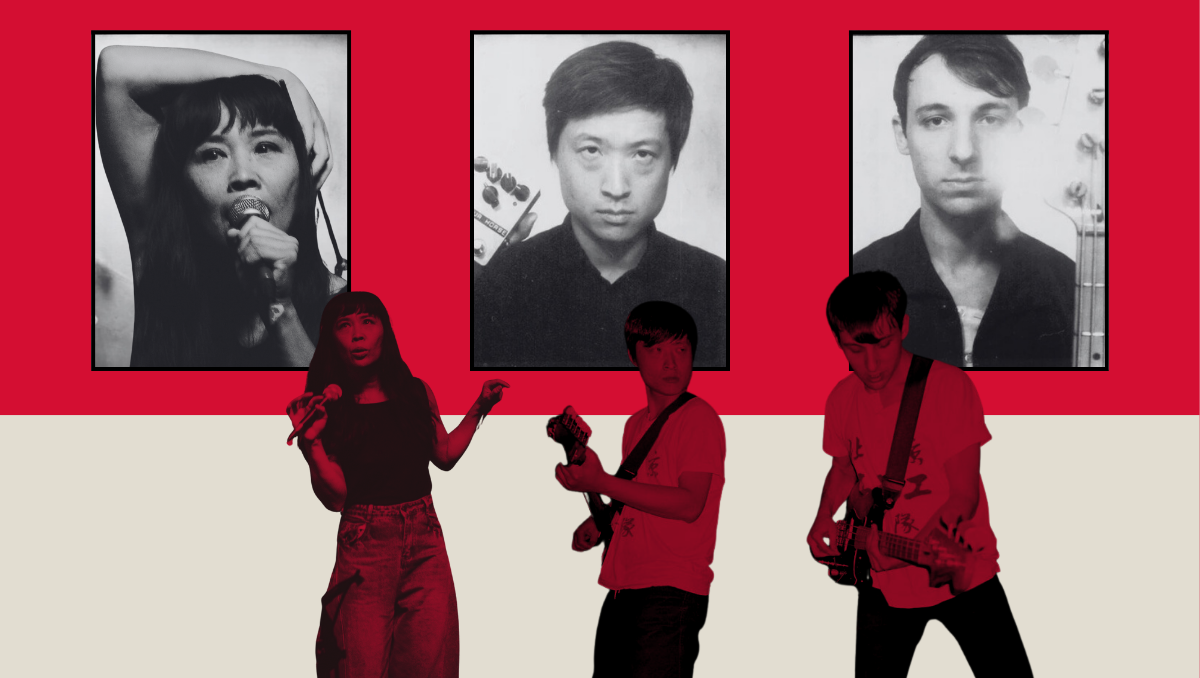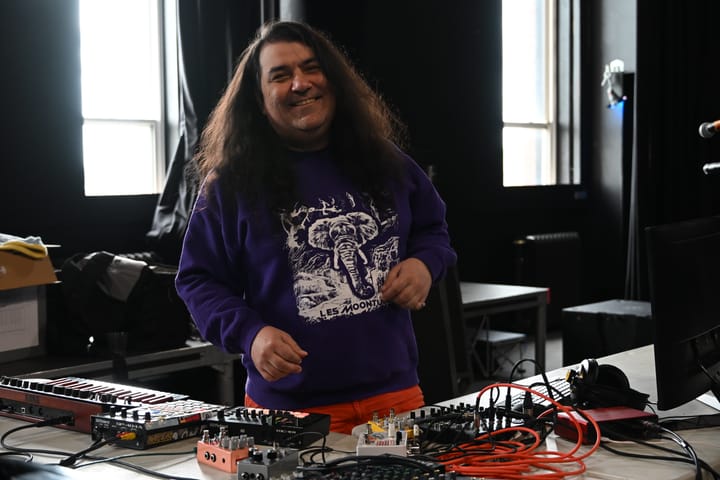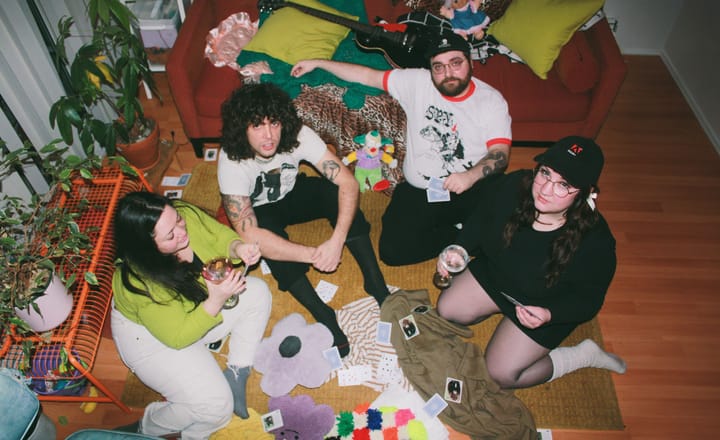
Sook-Yin Lee and Gong Gong Gong 工工工 Tap into the Universal Language of Music
When I think of artists with Chinese and Canadian roots who continually merge cultures in their work by pushing musical boundaries, I think of Sook-Yin Lee and Gong Gong Gong 工工工. Their multi-faceted artistic expressions inspire new possibilities for creativity and social connection. They spark imagination and allow us to dream beyond borders, real or imagined, self-generating or externally imposed. Their intersectional art reveals our commonalities, expanding our worldviews and fostering the collective learning necessary for uplifting one another amidst our collective struggles.
Since the 1980s, Lee has traversed musical genres including alternative rock as a member of Bob’s Your Uncle, electronic music in JOOJ with her late partner Adam Litovitz, and improvisational explorations with Dylan Gamble in Lee & Gamble Unlimited. That’s not to mention the Toronto artist’s numerous forays into art house film and theatre as an actor, director, dance choreographer, and soundtrack composer.
Gong Gong Gong 工工工, featuring Beijing-based singer-guitarist Tom Ng and Montreal-headquartered bassist Joshua Frank, similarly works within the framework of punk and rock steered by an appreciation of electronic music. Specifically, the drumless duo harnesses the hypnotic power of techno’s rhythmic repetition.
On July 13, Gong Gong Gong 工工工 performed two back-to-back shows at Vancouver DIY arts hub Red Gate. The first featured the band live-scoring Hong Kong Made Me, a short film by Greg Girard in which the renowned Vancouver photographer spliced together photos of Hong Kong and China’s Kowloon Walled City, as well as footage from the golden era of Hong Kong cinema, to chronicle the city’s cultural and physical transformation between the 1970s and the UK’s 1997 handover to China. In a closing Q&A with Girard, Ng, and Frank, the trio discussed the collaboration, originally conceived as a one-off presentation at M+, which describes itself as “Asia’s global museum of contemporary visual culture in Hong Kong.” The band capped off the doubleheader with a more straightforward concert following an opening set by Hotspring, the solo guitar project of local composer and producer Scott Johnson Gailey.
Though Lee has never visited Hong Kong, she maintains family roots in the former British colony. With her and Gong Gong Gong 工工工’s shared musical overlaps and Hong Kong connections in mind, New Feeling brought the three artists together via Zoom to discuss Ng’s full-circle homecoming trip to Richmond (a predominantly Asian city just south of Vancouver), the changing physical and cultural vistas of Hong Kong and China, keeping their music open to interpretation, and tapping into an undefinable but undeniable frequency in the universal language of music.
New Feeling (NF): Sook-Yin, how did you first come across Gong Gong Gong 工工工’s music? What were your first impressions of seeing them live?
Sook-Yin Lee (SL): I think I discovered your music after we met at La Lumière Collective [in Montreal], and then [Josh] told me [about Gong Gong Gong 工工工]. I was like, “Who are these people?” And then I clicked the link, and I was like, “Wow, this is cool.” And then I saw that you were playing on tour, and I was in town in Vancouver. You guys are like B.B. King, playing two shows a day.
Joshua Frank (JF): [Laughs] The Vancouver thing was kind of special because it was sort of like the film collaboration side plus the regular show thing.
SL: I really wanted to see the live-scoring and Greg Girard’s photographs because I’m also very curious about his images, but you were sold out. And then I was like, “Oh, they’re playing again? Okay, I’m going to see them.” And it was fantastic.
JF: We took [the live score] from a big art museum in Hong Kong into a DIY space in Vancouver. I think that fits for Gong Gong Gong 工工工 as well, that we tried to offer it in both contexts.
NF: Red Gate is such a DIY hub in Vancouver, and it has been for over a decade, so your show was very cool for me because it was a lot of different people I’d never seen there before, specifically with the earlier show.
Josh was saying before we started how the Vancouver shows were very special not just because of the Greg Girard connection but because he has spent some time in Vancouver. He also mentioned, Tom, that you have family in Richmond. What was it like for you to come back and spend a bit of time here and play these back-to-back shows?
Tom Ng (TN): We had this two-shows idea back in the days when we toured in China so we can just save more money for all the rent of the space, so we can try to make more money. So we are used to this kind of structure.
Coming back to Vancouver, I actually spent another few days [there]. Josh went back to China earlier than me, and I stayed behind so I could spend some time with my aunts. It’s really very special because it’s a special performance, and also, [my family has] never seen me play. One of them, actually, I knew a lot of music through them, so it’s kind of like a come-full-circle kind of thing. Apparently, they don’t know what I’ve been doing for the past 20 years. But it’s just really crazy to be able to play in front of them. And we went to the Chinese Canadian Museum with my other aunt. Now, they’re all over 60 years old. I haven’t seen them for a long time, so spending some time with them after the shows was actually really, really nice.
SL: What did they think of your music?
TN: I never asked. I guess if they like it, they would tell me, right? [Laughs] I think my cousins—they were like 25, 30 years old—oh, yeah, they never tell me they like it. They’re like, “Hey, good performance.”
NF: “It looked like you were having a lot of fun.”
JF: Yeah, yeah, that’s a classic. I’ve heard that many times. “You seemed to really enjoy yourself.”
SL: I wonder also, you said you learned music from them. How?
TN: I knew a little bit of music through one of my aunts because when she was young, she and her husband were kind of like hipsters back in the day. One thing I remember really vividly is they showed me this album by Cui Jian. Cui Jian is kind of the godfather of rock ’n’ roll in China. But at that time, [rock ’n’ roll] was a really weird thing to do in Hong Kong. [But then] there was this rocker from Beijing [who] somehow got really huge in China, and then people in Hong Kong were really curious. And then [my aunt and uncle] just gave me his album, and I just listened to it. I didn’t know about rock music. It was pretty crazy.
JF: That’s pretty crazy. I didn’t know they listen to Cui Jian. I don’t know what the equivalent would be for another culture because Hong Kong was such a cultural centre, especially at that time in the ’80s.
TN: Yeah, ’80s and ’90s.
JF: My parents would play his cassettes when we lived in China when I was a little kid. I listened to a lot of Cui Jian. I’d say he’s pretty influential to me. [Laughs]
SL: Cool. What was he like?
JF: He’s a trumpet player.
TN: With Korean origins.
JF: Yeah, he’s ethnically Korean, which is funny because there’s also a Russian [Viktor] Tsoi. [Editor’s note: the Mandarin pronunciation of “Cui” and the Russian pronunciation of “Tsoi” are similar.]
SL: Yeah, yeah, I love that guy. He’s so cool.
JF: [Cui Jian] was very ’80s multi-instrument, slightly jazz-influenced rock. He had protest songs as well. He was quite political. He couldn’t play shows in China for a while. But now he’s an old guy; he can do what he wants.
TN: Somehow, people got very curious about rock music from China […] But it only lasted for a short period of time because people were only being really curious about China rather than they actually liked the music.
JF: That still happens. [Laughs]
SL: That’s so cool. I love that you had a connection there with your relatives in Vancouver.
TN: Yeah, it’s really interesting.
JF: Greg Girard’s images of Hong Kong—for our music to be paired with that, I would imagine for Tom’s family or just the older generation who might not be that excited about our music on its own, to see those images is at the very least still quite nostalgic.
TN: Even when I was playing, there were a couple of images I knew […] There were a few shots of the Kowloon Walled City, which is right across [from] this building where I used to go with my mom, and she played mahjong with her friends. So as a kid, I was just standing in the balcony staring at the Walled City, and now, I’m playing my guitar, looking at that balcony. It just doesn’t make any sense.
SL: My dad grew up in Hong Kong. He grew up an orphan. His parents and both of his brothers passed, so he was raised by his sisters, and they owned a bra shop in Hong Kong. There’s this photo of them with big torpedo breasts and my dad, a little guy, beside them. I saw the address, and I Google Mapped it, and it’s a big mall now! It doesn’t exist anymore! Last time I was [home], I was like, “Dad, where is this place?” I was Googling through all these links to very many different Buddhist places. And then we finally found it! It’s amazing how quickly the vista changes and that you could see it still intact in your own memory.
NF: Tom, you had mentioned during the Q&A part of the show how much things have changed in terms of the music and arts scenes in China and Hong Kong. Did it happen very quickly? What was it like when Gong Gong Gong 工工工 started?
TN: When we first started [in 2015], Beijing was more relaxed, and you can basically do things with people interested. And there were a few more small spaces. Like, we can just do DIY shows. We were even playing shows in some underpass. There was a big enough crowd to support that. But they never really had a proper music industry in China. Everything tries to be very professional in not a very professional way. So venues started closing down. People’s tastes of music became narrower. It’s not like a sudden change, right? I mean, this is the 10th year of Gong Gong Gong 工工工, so over the past 10 years, you can see it gradually changing. And now, basically, in Beijing, I don’t think they have any DIY spaces anymore, like no small spaces. There would be like 500-people venues. It became really difficult for new bands or young musicians to start doing something on their own.
We’re doing some slightly bigger shows now, so we have to get approval from the government to be able to do a show that sells tickets. There are more spaces still doing that, but not that many.
SL: I was in Beijing in 2008. I was making short documentaries in China and Inner Mongolia. I did one on the punk scene in Beijing. It was really cool. At that point, it seemed like things were just opening up, and people were being able to express themselves. There was a real gush of “really wanting to express yourself!” It was very exciting. I interviewed one woman—she was an artist—and she said literally every month, the view from her apartment is different because they’re always building something bigger.
But in terms of punk rock, it was very interesting. Do you guys know the band P.K. 14? It was interesting to talk with them about, you know—he wanted to sing a song about Tibet, but he knew that he couldn’t, so how to approach lyrics that are personal and meaningful but also work around the censors? They were the only band I spoke to that wrote their own music at the time.
Then there was another band. They were real dirty, nasty punks. They were called Joyside. They just did covers, like all the iconic punk songs. On the outside, you’re like, “Oh, okay, so it’s punk, but you’re doing covers.” But they lived more punk than anyone else.
TN: Not anymore. They became a really big celebrity band.
SL: They did?? Oh, my god, that’s great! Because when I met them, they were only eating noodles.
JF: A lot of things have changed since then. The music scene in Beijing, the culture in Beiiing—in China, in the world—it’s not really the same world that it was before.
SL: Do you ever have to send your lyrics to the government to okay your lyrical content?
TN: If you want to play a proper show that sells tickets, then yeah, you have to do that.
JF: This is not to say that it isn’t a difficult thing to deal with, but it’s essentially bureaucracy. Instrumental bands will have to say, “What’s the idea behind these songs? What’s the message?” You can take it seriously, or you can not take it seriously. Gong Gong Gong 工工工’s lyrics tend to be very abstract, so some person reading the lyrics is just trying to check a few boxes. It doesn’t mean it’s not something that has an impact on the culture, but it’s also very banal at the same time.
SL: I remember talking to another band where basically, his group was able to circumnavigate the censors by having a lot of double entendre and poetic ways of saying things, so it was very open to interpretation. But he very much knew what he was trying to say. But you’re right. In terms of censorship, you guys were talking about how it’s changed a lot, that it’s maybe not as free or expressive in China.
I was thinking about pop music today in North America. Do you notice that a lot of the really popular bands look really edgy and wild, and then you listen to their music, and it’s really boring and the most G-rated pop? It sounds like China and North America are on a similar trajectory. We always talk about this idea of censorship in China, and yet right now, there is so much censorship in North America. A lot of people [have] to be very careful about what they’re saying. In China, I think it’s pretty much straight up. Here, people are self-censoring. They’re worried—for good reason. There are people that have lost their jobs in the arts for saying the wrong thing. And there’s a kind of paralysis. It’s up to the artist to always express. That is our role.
JF: In terms of the corporatization and toothlessness of a lot of seemingly edgy or cutting edge music, I think in that sense, China and the U.S. are very similar. It’s just that everything is 20 times faster in China, so it’s almost this more extreme version, or it’s a weird sped-up alternate reality version of it.
For example, you were talking about Joyside. A few years ago, there was this kind of rock band contest. In English, I think it was called Big Band, but in Chinese, it’s literally like Summer of the Bands. There’s a shortage of legendary bands in China; the market needed some legendary bands to be on this TV reality show, and so certain bands participated and became wildly famous. Even Gong Gong Gong 工工工 benefited from that, not through any real association but because seeing live music became this buzzy thing again in a very mainstream way, particularly in the couple of years after the pandemic. But then it also drove this push for bigger venues to open. This happened in a matter of years. So yeah, Joyside, they were in their own way stars of [their own] scene for being alcoholics and playing punk rock, and then they went dormant for like 10 years, and then boom: they’re one of the legendary bands.
SL: That also sounds very North American. One of my peers and mentors, John Cameron Mitchell, he’s an American filmmaker. I made two movies with him as an actor, Shortbus and Hedgwig and the Angry Inch. He’s very political, queer, a bold creator, and so many Gen Z people are like, “John, can you show us how to do ‘the punk?’” There’s hunger from young people to have meaning in wading through this morass of all this stuff that they’re exposed to. They want to feel something.
NF: That makes me wonder, you’re talking about these very unstable circumstances or shifting trends whether they’re political, economic, or artistic. You’re all tenured musicians. You’ve all been through it. You’ve all seen it across different cities and towns. How do you find or create stability among all these changing physical and abstract landscapes? Does the impermanence of everything influence how you approach and make art?
SL: I have this thing now. My credo is “Shred it and forget it.” You throw your guts in, you do your very best, and you put it out there, and then it has a life of its own, and you forget it. I don’t know any stability. I’ve never known stability in my entire life. Probably no one knows stability. And maybe some [aspects of] conservatism [are] last ditch effort[s] to keep it “coherent!”
TN: I always like to keep the meaning [of my lyrics] to myself. I sing in Cantonese. The lyrics are slightly different [for] the people who speak Mandarin in China, so I guess I’m safe. I’m not intentionally not telling people what I’m writing about, but more into having an open meaning for people to interpret for themselves. I can tell them they’re wrong if they have a wrong interpretation.
SL: It’s very universal, the language of music. When I saw you playing—I speak Cantonese, but I only know children stuff like, “Hurry up and eat, or I’ll hit you!”—I couldn’t understand all this stuff, but I’m watching you, and I’m getting a feeling because it’s music, and it’s an amazing thing. The two of you together are fantastic. Sometimes, I felt like you were two friends dueling. You’re playing very well, and you’re speaking from your heart, and it’s a very potent and wonderful expression in terms of universality and poetry. It’s a very distinct feeling, and it’s a great one, and it’s a great band.
JF: Thank you!
NF: When it comes to genre, I sense a lot of overlap between Sook-Yin’s musical work and the band. You both have a very distinct relationship with electronic and improvisational music, but there are definitely also kernels of something a little more structured whether it’s rock or punk music, and I’m wondering if you could all talk about how you merge those more amorphous forms of music and the more structured. I know Gong Gong Gong 工工工, you have quite the relationship with electronic musicians from both China as well as specifically Vancouver with Yu Su and Scott Johnson Gailey. Can you talk about the parallels or complementary elements between the music you make and specifically electronic music?
JF: The answer is repetition. That’s kind of the core. I like to play weird music, and I like to maybe confuse people or do something that feels sonically challenging. When I began to play music, I was interested in making noise. But then I started to realize pretty quickly through rhythm and repetition and also performance that you can create something that is actually very accessible despite being really weird because people take in the fact that you’re trying to express something very genuine, and you’re also putting your energy into it in a way that’s undeniable.
We’re taking a lot of different elements from different kinds of music we like but always trying to find what the common ground is and expressing that, whether it’s just simple melodies that feel like they could be from different places in the world or just a rhythm that makes you move or just the way Tom [is] taking from Cantopop influences or our own idea of Cantonese opera. And then we’re just filtering it through the limitations of our instruments and also processing it through our friendship and collaboration. Lots of stuff comes in, then we digest it, and what comes out hopefully is that core that unites techno, West African guitar music, the blues, noise, Cantopop, and classical music. It’s processed through our bodies and our shitty instruments. [Laughs]
TN: At the same time, we don’t want to sound like anything else. Why should you want to do that?
SL: I’m entirely self-taught in all regards: in movies, broadcasting, music, in everything that I’ve done. I just kind of grab things. I find things that are not instruments, and I play them.
Growing up, my relatives would say, “You’re a banana. You’re yellow on the outside, white on the inside.” And they’d be making fun of me in Cantonese, and I’m like, “Hey, I can understand you.” And I’d talk back, and they’d be like, “How do you know?” So even if I’m not as fluent in Cantonese, there’s an undeniable part of me that is Chinese. There is a directness in the way I speak, and the work is filtered through my brain, so it’s kind of curvy and unusual, but it makes all the sense to me.
My first song that I wrote was inspired by Wayne Wang’s first film, Chan Is Missing. It’s about the Chinese-American experience. A taxi driver, Chan, has gone missing, and the whole movie is his friends, who are Chinese taxi drivers, are looking for Chan. They go through San Francisco and all these curvy little holes. It really spoke to me as a kid, like, “Oh my god, that’s me! That’s my world!” I wrote this song called “Chan Is Missing.” I wrote it on guitar. I had this break in it, and my friends who were not Chinese, they’d be like, “What is that?” Even people who could play guitar well couldn’t do it. And the only person who could do it was my little sister, Dede. She could completely ape that break.
I do think that maybe we know and can access all music of the world everywhere. We can access so much stuff with our brains, in the unconscious realm, something that comes through that we can all access, through absorbing, putting it through the processor […] In our own personal little unique way, we put it back out there.
Read more

Sentries: Multifaceted Noise Rock

Step Into Little Stone Crow's World

